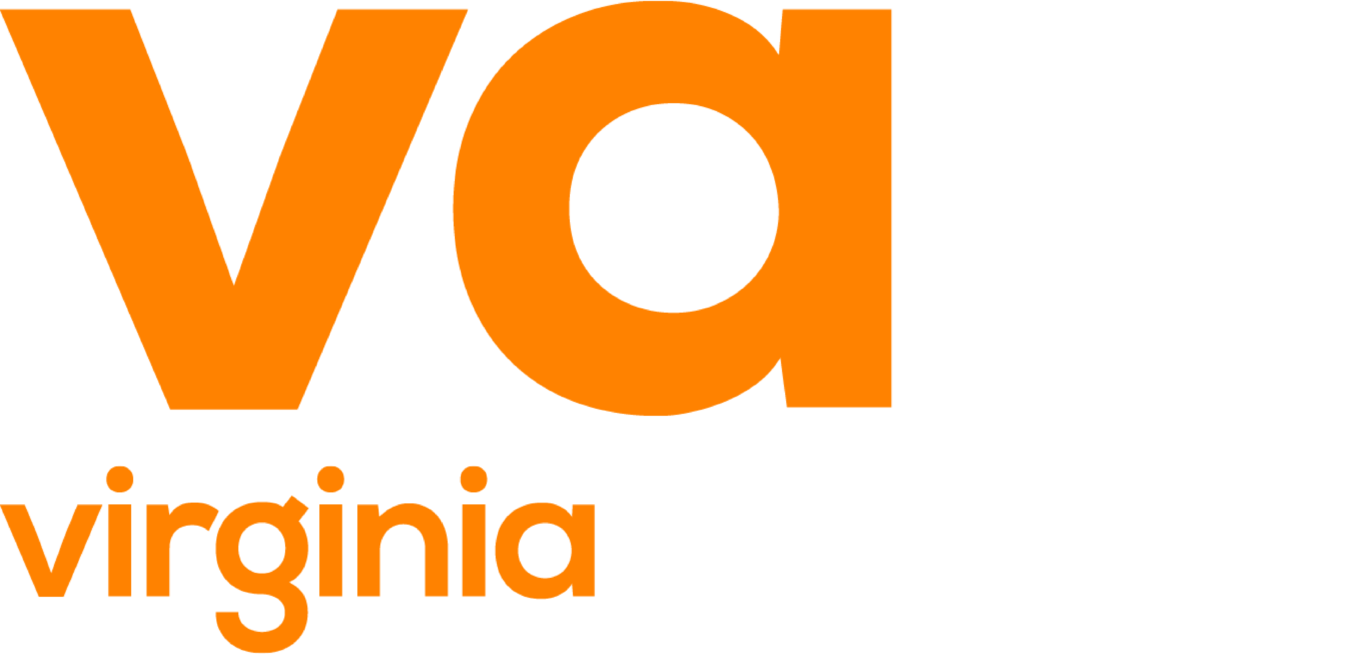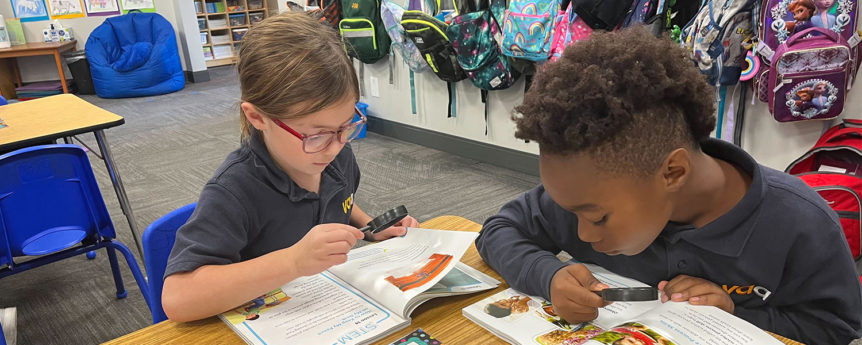Guiding Philosophy of Education
Virginia Academy views itself as an indispensable part of the three major forces in the life of each child: the home, the school, and the church. Virginia Academy was founded and functions upon the basic fundamental principles of the Word of God, and it espouses the historic Christian view of life as presented in the Bible. The following are guiding statements of our philosophy of education.
- The purpose of education is to prepare students for life. We believe a person’s best life is found in acceptance of and obedience to Christ.
- God is the creator of all things. He is the source of all truth.
- God’s Word is a necessity for correction and effective training and instruction in knowledge and wisdom.
- The ultimate responsibility for educating children rests with parents.
- The Christian school is a mission of the church and a valuable resource for parents in the equipping and education process.
- An effective Christian school consists of a genuinely Christian staff and curriculum and guiding principles deeply rooted in the truths of God’s Word.
- An effective curriculum is one that reveals the truth of God’s Word and world; focusing on developing students spiritually, emotionally, and physically as well as intellectually.
- Teachers have an awesome privilege and responsibility as educators and should consider carefully their power to influence a child’s decision to engage with, receive and/or reject truth.
- All children can and do learn, but do so best when they are considered as individuals and are given an opportunity to explore their unique genius in an environment of love, high engagement, and order.
- The end goal of our educational efforts should be to launch intellectually sound and spiritually dynamic followers of Christ into the world.
Academic Support
Virginia Academy views each student as an individual and endeavors to meet the academic needs of every student. With the help of our academic support coordinator, we are able to develop specific educational plans for students who both require remediation as well as enrichment or acceleration. On a case by case basis, as requested by parents, we are also able to provide academic support for students with learning differences by managing and making some accommodations for students with IEPs (Individual Education Programs). Students’ IEP’s will be reviewed to identify needs and determine our ability to develop an academic plan of success; specific testing will be used to diagnose learning gaps, a specialist will prescribe a specific curriculum to address the issues, and the program of study will be implemented. There may be additional fees associated with programs offered.
Curriculum
Virginia Academy’s curriculum is presented from a God-centered worldview and prepares students for college as well as lifelong success. Students are encouraged to excel at the highest level possible with advanced placement (plus) courses offered as early as preschool. In all grades, Bible, foreign language and physical education classes are offered at least twice a week along with field trips and a variety of electives to make for a very well rounded student with the character needed to be successful in the eyes of man and God. Electives include but are not limited to drama, computers, art, and chorus.
Accreditation
Virginia Academy is fully accredited by the International Christian Accrediting Association (ICAA) and the Southern Association of Colleges & Schools, which also certifies our faculty and affords us full accreditation with the State of Virginia.
International Christian Accrediting Association (ICAA)
The purpose of ICAA is to assist Christian educational institutions in the improvement of education within its Christian distinctiveness by establishing an organizational witness to their credibility of performance, integrity, and quality. All schools accredited by ICAA share these distinctions:
- to identify themselves as educational institutions led by the Holy Spirit to glorify God and His Son, Jesus Christ, in all programs and activities
- to accept the Statement of Faith adopted by the Association
- to agree to promote and adhere to the Standards and Procedures of the Association
- to identify with the charismatic/pentecostal movement of the Christian faith
- to maintain membership in ORU Educational Fellowship
For more information, visit the ICAA website.
Southern Association of Colleges & Schools (Cognia)
The mission of the Southern Association of Colleges and Schools is the improvement of education in the South through accreditation. School leaders engaged in Cognia Accreditation will:
- Take stock of themselves in relation to a set of research based quality standards
- Establish a vision, assess their current reality, implement and improvement plan, monitor progress and evaluate results
- Enhance the school’s best thinking with the insights and perspectives of an external review team
For more information, visit The Cognia Website.
Testing
Stanford 10
In addition to our course assessments, Virginia Academy tests students in all grades, Kindergarten through HS, rather than 3rd, 5th, 8th, and 11th, which is done in most public schools. This allows Virginia Academy to consistently gauge the academic performance levels of all students. Virginia Academy test results show that students maintain a steady lead over national mean scores on the Stanford Achievement Test, which compares our students to their peers throughout the country.
Students kindergarten through 2nd grade take the Stanford 10. It provides a comparison of achievement on a sample of grade-level curriculum to their national group. The purpose of the test is to provide a comparative rank and to show how a student performs when compared to their peers. The Stanford is scored on a scale of 1 to 99, with 50 representing the middle national ranking. Students are tested in the following subjects: Reading, Mathematics, Language, Spelling, Science and Environment, Social Studies. Students also receive a score on the Core components and Complete Battery of the test.
ACT Aspire
Our 3rd through 10th-grade students test each spring but take the ACT Aspire test. The ACT Aspire is grounded in and has built-in benchmarking for the college readiness ACT test. This test allows us to track the yearly progress and readiness for college longitudinally while providing teachers and parents key prescriptions for needed improvement along the way. Students test in English, reading, and writing as well as science and math. ACT Aspire subject tests offer a bridge to the ACT test. ACT Aspire and the ACT cover the same subjects, including the Writing test, which is optional for the ACT. The predicted ACT score ranges that are included in the 9th and 10th-grade students’ score reports can guide college preparation or workplace training efforts. Students can use the predicted ACT scores to see if they are on target to achieve the ACT scores desired by the time they take the college readiness ACT.
PSAT
Virginia Academy is a College Board approved PSAT test site. Therefore, all Virginia Academy students begin taking the PSAT in the fall of their 8th-grade year right here at Virginia Academy. The Preliminary SAT/National Merit Scholarship Qualifying Test (PSAT/NMSQT) is a program cosponsored by the College Board and National Merit Scholarship Corporation (NMSC). It’s a standardized test that provides firsthand practice for the SAT®. It also gives you a chance to enter NMSC scholarship programs and gain access to college and career planning tools. The PSAT/NMSQT measures: Critical reading skills, Math problem-solving skills, and Writing skills.
SAT
Virginia Academy is a College Board approved SAT test site. All Virginia Academy students will take the SAT at least once during their 11th and 12th-grade years and can do so right here at Virginia Academy. The SAT is a globally recognized college admission test that lets you show colleges what you know and how well you can apply that knowledge. It tests your knowledge of reading, writing, and math — subjects that are taught every day in high school classrooms. Most students take the SAT during their junior or senior year of high school, and almost all colleges and universities use the SAT to make admission decisions.
Taking the SAT is the first step in finding the right college for you — the place where you can further develop your skills and pursue your passions. But SAT scores are just one of many factors that colleges consider when making their admission decisions. High school grades are also very important. In fact, the combination of high school grades and SAT scores is the best predictor of your academic success in college.

